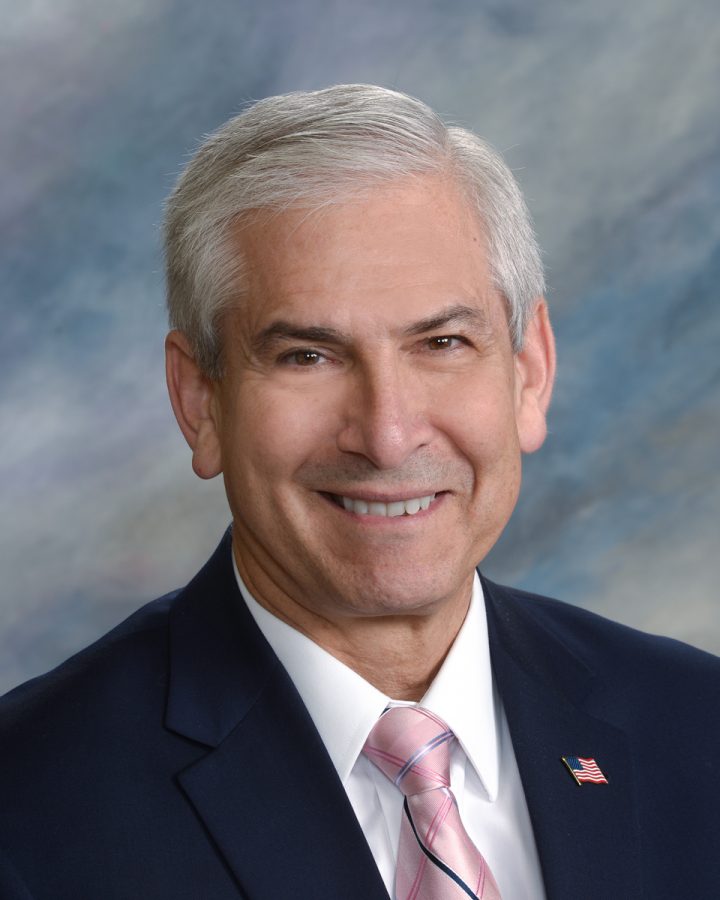Bill criminalizing gender surgery on minors goes to House
JOHNNY SUNDBY
Fred Deutsch (R-Florence) is the sponsor of HB1057, the Vulnerable Child Protection Act.
January 22, 2020
PIERRE — It was a case of dueling experts Wednesday morning before the House State Affairs Committee as both sides in the debate on HB1057 presented testimony from doctors, lawyers and counselors. At issue in the bill is whether doctors should face a legal penalty for performing gender altering surgery on minors younger than 16.
Prior to debate on the bill, its sponsor, Rep. Fred Deutsch, R-Florence, offered three amendments. One amendment changed the penalty from a Class 4 felony to a Class 1 misdemeanor. Another lowered the age at which surgery would be barred from under 18 to under 16. A third omitted nurses and anesthetists from being subject to the law.
The amendments were approved, as was the bill after it was discussed for more than two hours before a packed committee room.
In addition to a variety of surgeries that can alter gender, HB1057 also prohibits doctors from prescribing puberty blocking drugs or high doses of estrogen for males and high doses of testosterone for females.
Likening his legislation to a “pause button,” Deutsch said, “We want to give children the time to simply grow up.”
Deutsch said gender altering surgery or medicines are often turned to “based solely on a child’s feelings. As you all know, feelings change, especially in children.”
Deutsch said that many adolescents that suffer from gender dysphoria, a condition in which there is a mismatch between a person’s biological sex and their gender identity, will grow out of it before they reach adulthood.
“It protects children by allowing natural puberty to occur,” Deutsch said the legislation.
Speaking in favor of the bill, Dr. Mike Laidlaw, an endocrinologist, said puberty suppressing drugs can cause irreversible harm to bone density, brain development and pituitary development.
“These hormones are a path to sterilization,” Laidlaw said.
Dr. Bernard Hudson, a psychiatrist, said most children will eventually come to accept their biological sex. Subjecting children to hormones and surgery, Hudson said, “makes them a patient for life.”
David Pickup, a marriage and family therapist, said minors whose brains are still developing need the state’s protection.
“I don’t believe a minor can ever give informed consent,” Pickup said.
Scott Newgent, who identified himself as a trans man, said he will be dependent on doctors and drugs for the rest of his life.
“The changes I underwent should never be offered to children,” Newgent said.
Speaking in opposition to the bill, Dean Krogman, a lobbyist for the South Dakota Medical Association, said gender altering treatment for minors “is a science-based medical diagnosis.”
Krogman said passage of the law would have national legal implications for South Dakota.
“We think this is very risky,” Krogman said. “We think parents should be in control.”
Health care decisions are private, personal matters and not the business of government, according to Mitchell Rave, a lobbyist for Sanford Health.
“We follow well-established policies of care,” Rave said.
Michelle Schimelpfenig, an associate professor of pediatrics at the University of South Dakota Medical School, called the legislation a “vote of no confidence” in the medical profession.
“Please don’t make me choose between evidence-based medicine and jail,” Schimelpfenig told the committee.
If HB1057 becomes law, it will hurt businesses in South Dakota, according to David Owen of the South Dakota Chamber of Commerce and Industry.
“The headlines that go nationwide will cost us,” Owen said. “These kinds of economic consequences are real.”
Owen’s remarks were echoed by lobbyists for the South Dakota Retailers and the Sioux Falls Chamber of Commerce.
Kim Park of Sioux Falls, who is raising a non-binary child who identifies as neither male nor female, told legislators that great care goes into the medical decisions that are made about her child.
“You are telling me that you know what’s best for my child,” Park said. “This is not a legislative decision.”
Discussing his reasons for supporting the bill, Rep. Jon Hansen, R-Dell Rapids, noted that while he has respect for the transgender community, he must do what he can to protect children.
“These kids cannot possibly know the long-term consequences,” Hansen said. “We treat kids differently, under the law.”
Rep. Jamie Smith, D-Sioux Falls, said he was looking for a South Dakota problem throughout all the testimony and couldn’t find one.
“We’re assuming we know better than medical providers,” Smith said. “I don’t want to be a court case at the federal level, a litmus test for our country.”
The legislation passed through the committee on a vote of 8-5 and will now go to the full House.






















